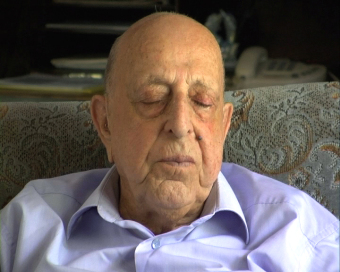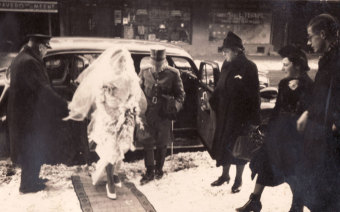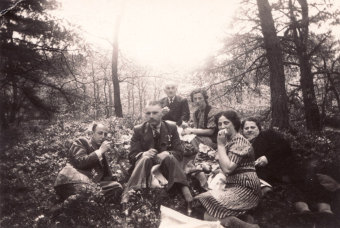Justus E. Marchand (*1914)

© Fritz Bauer Institute

© Justus E. Marchand

© Justus E. Marchand
Justus Emmanuel Marchand was born in Amsterdam in 1914 and grew up in middle-class circumstances. His father, Isaac Marchand, one of the first importers of bicycle inner tubes, was of Sephardic origin, his mother, Rachel De Groot, Ashkenazic. Religion was not an issue for Justus Marchand, however, until his parents sent him to Jewish Sunday school and he became Bar Mitzvah. He became active in a Zionist youth group, though neither he nor his family contemplated emigration to Palestine.
In 1932, after finishing secondary school, Justus Marchand was called up for military service. After that, he began an apprenticeship as a metallurgist and worked in the metal and steel industry. In an advanced training course, he met Hetty Monasch. They became engaged in January 1938 and married two years later. In 1939, Justus Marchand became an infantry lieutenant in the Dutch army. When the Netherlands capitulated on May 14, 1940, Justus und Hetty Marchand went underground. They succeeded in obtaining passports identifying them as non-Jewish citizens of the Netherlands. Using assumed names, they worked in the resistance movement against the German occupation forces. Justus Marchand’s mother died in 1940 when she fell down the stairs, and his father managed to go into hiding and survive the war years in that way.
Justus Marchand was betrayed and arrested by the Gestapo; still using a false name, he was deported to the Herzogenbusch concentration camp. After a fellow prisoner recognized him and exposed him as a Jew, he was deported from there via Westerbork to the Buna/Monowitz concentration camp. There Justus Marchand was first assigned to the cement detachment. The Dutch Oberkapo Joop saw to it that he was placed in the payroll clerks’ detachment. He felt that this work detachment was an “elite detachment,” meaning that the prisoners were given enough to eat and real clothing, and were allowed to send letters (censored and written in German) through the mail room.
On January 18, 1945, the SS forced the prisoners of the Buna/Monowitz concentration camp to go on a death march. For Justus Marchand, it ended in the Mittelbau-Dora concentration camp. There he developed diarrhea and typhus and fell into a feverish coma, so that he did not consciously experience his liberation. He was cared for in a U.S. Army military hospital and returned to Amsterdam in the summer of 1945. His wife had spent the entire war as an illegal, working in the resistance. Among other things, she helped Jews who were in hiding to get out of the country by using the passports of other people.
Justus Marchand returned to the Dutch army and worked there. At the urging of his wife, Hetty Marchand, they emigrated in 1947 to Palestine, where Justus Marchand fought in Israel’s War of Independence. Justus and Hetty Marchand settled down in a small village, Hadar Am, near Netanya. With their two sons, they first supported themselves by raising chickens and running a small orange orchard, and by Julius Marchand’s moonlighting in road construction and in a school. Later he worked for a bank, and then at a plant that produced pharmaceutical substances.
In the meantime, Justus Marchand has become a great-grandfather. Hetty Marchand passed away in the spring of 2007.
(SD; transl. KL)
Justus Marchand, oral history interview
(German)
















